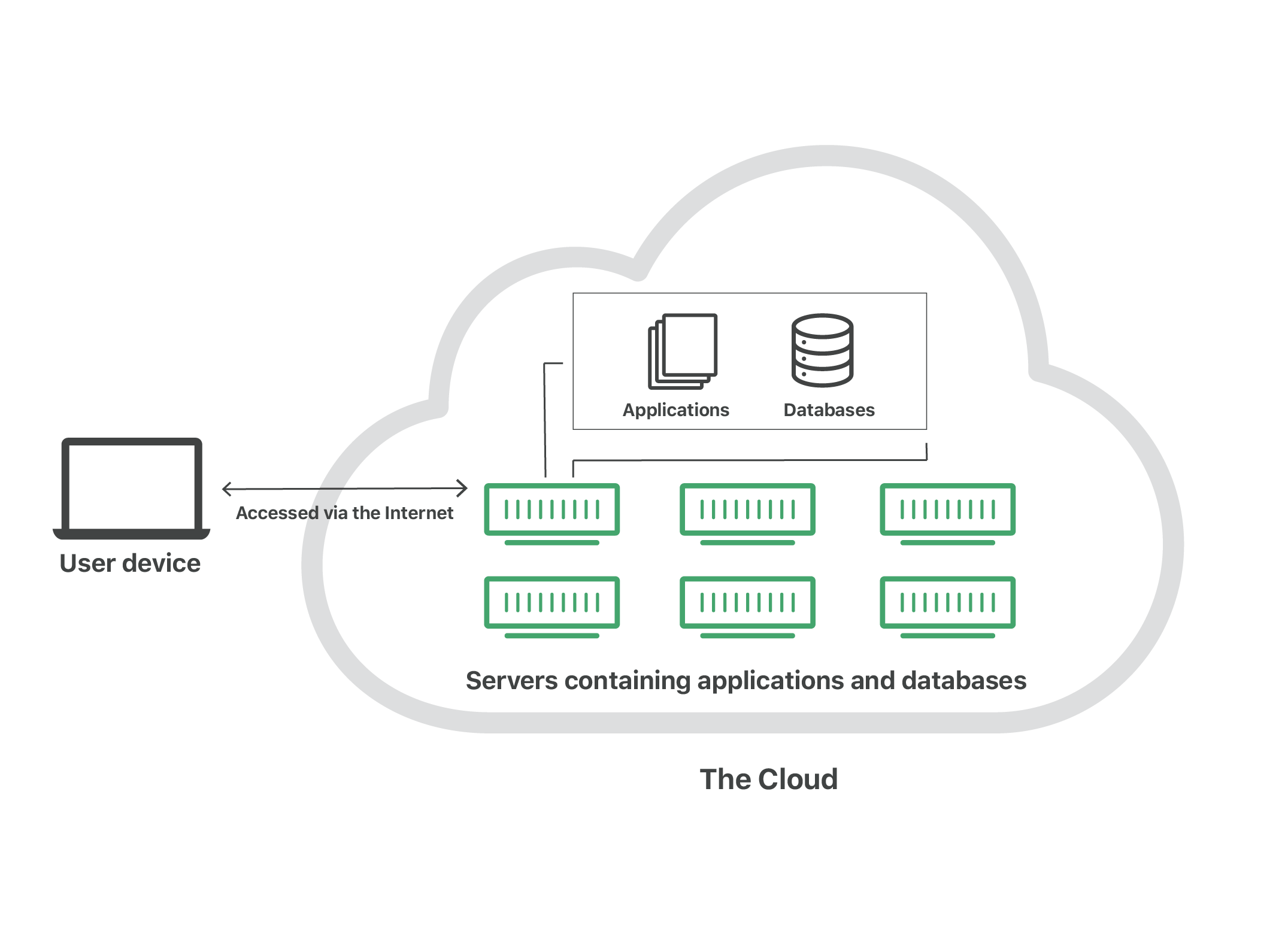「雲」是指透過 Internet 訪問的伺服器,以及在這些伺服器上運行的軟體和數據庫。 雲伺服器位於世界各地的數據中心。 透過使用雲端運算,使用者和公司不必自己管理實體伺服器,或在自己的機器上運行軟體應用。

雲使用者幾乎可以從任何設備,訪問相同的文件和應用,因為運算和儲存在數據中心的伺服器上進行,而不是在使用者設備本地進行。 這就是為什麼使用者可以在舊手機壞掉後,在新手機上登錄他們的 Instagram 帳戶,並且仍然可以找到舊帳戶,以及他們所有的照片、影像和對話歷史的原因。 它與 Gmail 或 Microsoft Office 365 等雲端電子郵件提供商,以及 Dropbox 或 Google Drive 等雲儲存提供商的工作方式相同。
對於公司而言,改用雲端運算可扣除一些 IT 費用和附加費用:例如,他們再也不需要更新和維護自己的伺服器,因為他們使用的雲端廠商會負責進行。這對於小型企業特別有影響,因為小型企業可能無法負擔自己的內部基礎結構,但可以透過雲端,以可負擔的費用外包他們的基礎結構需求。雲端也能讓公司更輕鬆地進行跨國營運,因為員工和客戶可以從任何位置存取相同的檔案和應用程式。
雲端運算如何運作?
由於一種稱為虛擬化的技術,雲端運算成為可能。 虛擬化允許創建一個模擬的、純數位的「虛擬」電腦,它的行為就像一台擁有自己硬體的實體電腦。 這種電腦的技術術語是虛擬機。 如果實施得當,同一台主機上的虛擬機將彼此隔離,因此它們之間根本不會相互交互,並且一台虛擬機中的文件和應用對其他虛擬機不可見,即使它們在同一台實體機。
虛擬機器也能更有效率地使用代管虛擬機器的硬體。藉由一次執行許多虛擬機器,一個伺服器會成為許多伺服器,而資料中心會成為資料中心的整個主機,能夠為許多組織提供服務。因此,雲端提供者可以立即向遙遠的客戶提供使用伺服器(這些客戶之前可能要以其他方式使用),而且客戶可以透過較低的費用這麼做。
即使個別伺服器故障,雲端伺服器通常應永遠連線且永遠可用。一般而言,雲端廠商會在多個機器及多個區域備份服務。
使用者透過瀏覽器或應用訪問雲服務,透過網路(即通過許多互連網路)連接到雲,無論他們使用什麼設備。
什麼是雲端運算的主要服務模型?
軟體即服務 (SaaS):與使用者在裝置上安裝應用程式不同,SaaS 應用程式在雲端伺服器上代管,使用者則透過網際網路存取。SaaS 類似租房子:房東維護房子,但在大部分的時候,租客是房子的使用者,彷彿租客才是屋主。SaaS 應用程式的例子包括 Salesforce、MailChimp 和 Slack。
平台即服務 (PaaS):在此模型中,公司不會支付代管的應用程式;而是支付建置自己的應用程式時所需的內容。PaaS 廠商透過網際網路提供建置應用程式所需的一切,包括開發工具、基礎結構和作業系統。PaaS 可比喻為租用建造房屋的所有必要工具和設備,而非租用房屋本身。PaaS 例子包括 Heroku 和 Microsoft Azure。
Infrastructure-as-a-Service (IaaS): In this model, a company rents the servers and storage they need from a cloud provider. They then use that cloud infrastructure to build their applications. IaaS is like a company leasing a plot of land on which they can build whatever they want — but they need to provide their own building equipment and materials. IaaS providers include DigitalOcean, Google Compute Engine, and OpenStack.
之前,SaaS、PaaS 和 IaaS 是雲端運算的三種主要模型,基本上,所有雲端服務都可歸類到這些類別。不過,最近幾年,出現了第四種模型:
Function-as-a-Service (FaaS): FaaS, also known as serverless computing, breaks cloud applications down into even smaller components that only run when they are needed. Imagine if it were possible to rent a house one little bit at a time: for instance, the tenant only pays for the dining room at dinner time, the bedroom while they are sleeping, the living room while they are watching TV, and when they are not using those rooms, they don't have to pay rent on them.
FaaS or serverless applications still run on servers, as do all these models of cloud computing. But they are called "serverless" because they do not run on dedicated machines, and because the companies building the applications do not have to manage any servers.
Also, serverless functions scale up, or duplicate, as more people use the application — imagine if the tenant's dining room could expand on demand when more people come over for dinner! Learn more about serverless computing (FaaS).
雲端部署有哪些不同類型?
與上述討論如何透過雲端提供服務的模型相反,這些不同的雲端部署類型必須透過雲端伺服器的所在位置以及管理者來執行。
最常見的雲端部署包括:
- Private cloud: A private cloud is a server, data center, or distributed network wholly dedicated to one organization.
- Public cloud: A public cloud is a service run by an external vendor that may include servers in one or multiple data centers. Unlike a private cloud, public clouds are shared by multiple organizations. Using virtual machines, individual servers may be shared by different companies, a situation that is called "multitenancy" because multiple tenants are renting server space within the same server.
- Hybrid cloud: hybrid cloud deployments combine public and private clouds, and may even include on-premises legacy servers. An organization may use their private cloud for some services and their public cloud for others, or they may use the public cloud as backup for their private cloud.
- Multi-cloud: multi-cloud is a type of cloud deployment that involves using multiple public clouds. In other words, an organization with a multi-cloud deployment rents virtual servers and services from several external vendors — to continue the analogy used above, this is like leasing several adjacent plots of land from different landlords. Multi-cloud deployments can also be hybrid cloud, and vice versa.
Cloudflare 如何輔助公司遷移至雲端並在其中操作?
Cloudflare 協助保護和管理任何類型的雲端部署。我們的網路位於終端使用者以及客戶的產品或服務的雲端基礎結構之間。客戶可以從單一儀表板管理效能、安全性、DNS 及 Cloudflare 為所有雲端部署提供的其他項目。Cloudflare 提供 web application firewall (網頁應用程式防火牆) 以保護網際網路設備免受弱點利用。Cloudflare 也能讓公司在雲端部署中輕鬆納入 FaaS (無伺服器)。
在此閱讀 Cloudflare 的 SaaS 解決方案相關資訊。
雲端與網際網路的傳統用戶端伺服器模型有什麼差異?
The Internet has always been made up of servers, clients, and the infrastructure that connects them. Clients make requests of servers, and servers send responses. Cloud computing differs from this model in that cloud servers aren't just responding to requests — they're running programs and storing data on the client's behalf.
為什麼稱為「雲端」?
「雲端」起於科技業的通俗術語。在網際網路早期,技術圖表通常以雲狀呈現組成網際網路的伺服器和網路基礎結構。隨著越來越多運算流程遷往網際網路的這類伺服器與基礎結構部分,大家開始談論遷往「雲端」,作為表達運算流程發生位置的簡易方式。現今,對於這類運算,「雲端」已經成為廣泛採用的術語。
那麼容器呢?容器是 IaaS、PaaS、SaaS 或 FaaS?
如同虛擬機器,容器是一種雲端虛擬技術。這屬於 PaaS (平台即服務) 雲端模型。容器的虛擬化會對虛擬機器從發生位置向上產生一個抽象層,這位於作業系統層級,而非核心層級 (核心是作業系統的基礎,並與電腦的硬體互動)。每個虛擬機器都有自己的作業系統核心,但位於相同機器上的容器則共用相同的核心。
 |
| IDVIEW 不只是縮時攝影 |


沒有留言:
張貼留言